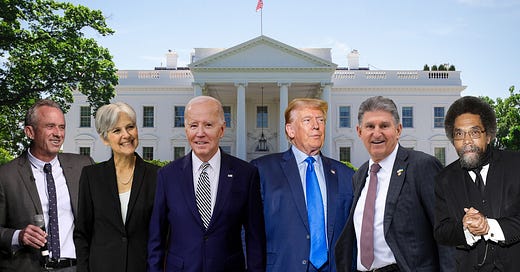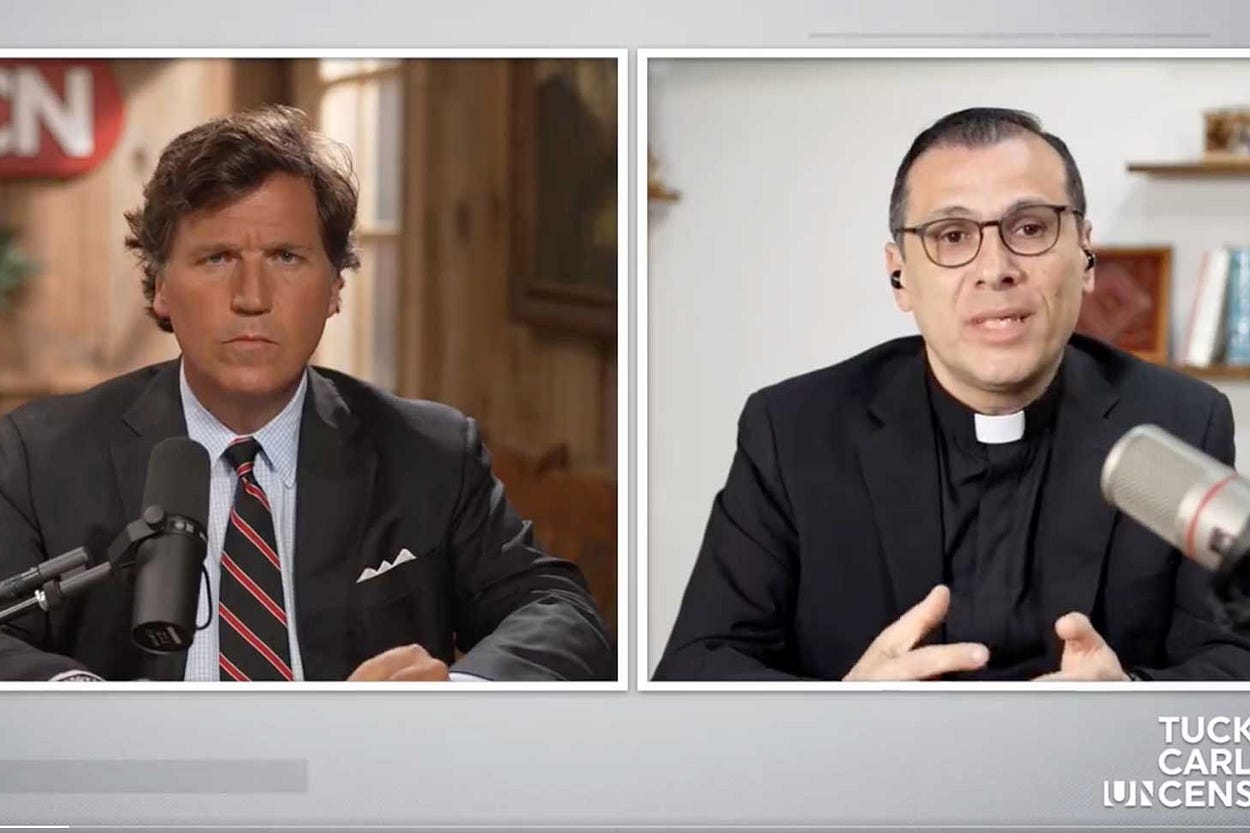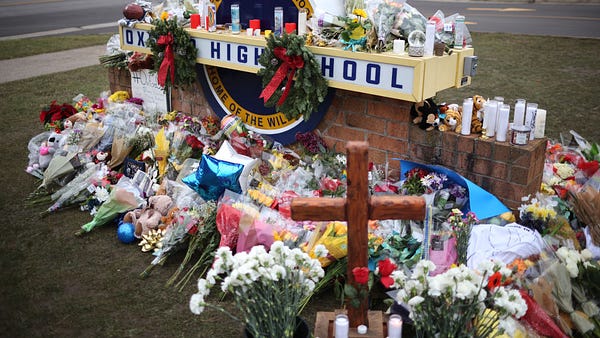
The Free Press

Will Joe Manchin run for president? How many more candidates will enter the 2024 race? Is the two-party system crumbling before our eyes? All this and more on the presidential race to follow. But first, today’s lead story. . .
We live in an age of lazy analogies. Among the laziest and least helpful is the comparison made by some progressives between the Arab-Israeli conflict and the fight for black equality in the U.S. and South Africa.
As Free Press columnist Coleman Hughes explains in his latest essay, it’s not hard to see the parallel’s appeal: “Once framed this way, the correct view becomes obvious. Israelis: racist oppressors. Palestinians: noble victims.” And from this framing, all sorts of muddled thinking follows, including the idea, pushed by the likes of Amnesty International, that Israel is “an apartheid state.”
Coleman takes a wrecking ball to this sloppy logic by laying out the history. Read the full piece:
As the Israel-Hamas war drags on in its second month and shows no sign of abating, many Westerners have drawn comparisons between the state of Israel and Jim Crow-era America or apartheid South Africa. In their telling, Israelis are the white people, Palestinians are the black people, and the ethics of the conflict mirror the ethics of Jim Crow and apartheid.
Once framed this way, the correct view becomes obvious. Israelis: racist oppressors. Palestinians: noble victims.
This view of the Israeli-Arab conflict has lodged itself deeply in the Western psyche. It is why organizations like Amnesty International condemn Israel as an “apartheid state” despite the glaring differences between Israel and the canonical example of apartheid South Africa. It is why Black Lives Matter chapters across America came out in reflexive support of Hamas mere days after the terror group slaughtered 1,200 Israelis in the most gruesome ways imaginable. And it is why Ta-Nehisi Coates, considered by many to be America’s leading public intellectual on race, recently called Israel a “Jim Crow regime” and compared cities in the West Bank to Baltimore and Chicago.
But close-to-home analogies rarely explain distant events. These analogies, while convenient and easy to understand, do more to mislead than to inform. Nowhere has this been truer than in comparisons between the Israeli-Arab conflict and the West’s racial and colonial history.
Here Comes Everybody
Consider the following developments, all of which have happened since we last checked in on the presidential election from hell:
Joe Manchin, the centrist Democrat from West Virginia, announced he will not be seeking reelection in the U.S. Senate. In a video message announcing the move last week, Manchin said that he will be “traveling the country and speaking out to see if there is an interest in creating a movement to mobilize the middle and bring Americans together.” The centrist group No Labels, which is chaired by Democrat Joe Lieberman and Republican Larry Hogan and is threatening a third-party challenge, issued a statement singing Manchin’s praises.
Yesterday, in his first interview since his announcement, Manchin told NBC that he would “absolutely” consider a presidential run, saying: “I’m going to do everything in my power to. . . mobilize that moderate, sensible, commonsense middle.”
Jill Stein, who won 1 percent of the vote as the Green Party candidate in 2016 and was blamed by many on the left for Trump’s win, announced she will be running again.
The second set of polling in a week, this time from Morning Consult, showed Biden losing heavily to Trump in swing states.
Suddenly the general election field is starting to look a bit crowded. In addition to whomever is nominated by the major parties, there’s dissident Democrat RFK Jr., who currently scoops up about a fifth of voters in many polls. Add to that the twin challenge from the far left: Jill Stein and Cornel West. Then there’s the possibility of a No Labels “unity” ticket, involving Manchin or some Manchinesque moderate.
And who can say if that’s where it stops? When I spoke to polling guru Nate Silver last week, he postulated it was possible other credible third-party candidates could enter the race. “I don’t want to mention any particular names and speculate,” he said, “but if you’re a rich centrist, or a rich actor with an interest in politics, you might be saying to yourself, ‘Look, RFK Jr. is at 22 percent. If I can get to 32 percent then I’m tied for the lead.’ It wouldn’t shock me if you have other people who at least feel out running.”
Meanwhile, Dwayne “The Rock” Johnson, a megastar moderate who has been talked about as a potential celebrity presidential candidate, popped up on Capitol Hill yesterday. He did not give reporters a straight answer when asked if he was running for president.
Just imagine: The Rock vs. RFK vs. Cornel. . . with Matthew McConaughey vying for the VP pick.
As this Wall Street Journal graphic makes clear, a crowded field helps Trump and hurts Biden. But it also just makes the outlook so much more unsettled. The paradox of the 2024 race is that it threatens to be both a rematch of the last election and a messy, unpredictable scramble without precedent.
What explains all this weirdness? A big part of the story is Trump and Biden: their obvious shortcomings and well-documented unpopularity create demand for an alternative.
But the major-party candidates are only part of the story. The growing list of 2024 candidates reflects a country in a restive mood, an electorate in the midst of a major realignment, and a political system at a turning point. A greater number than ever consider themselves political independents, but that can mean very different things to different people. It captures old-guard moderates and populists on the left and the right as well as a less obviously left- or right-wing anti-establishment sentiment encapsulated in RFK Jr.’s candidacy.
The last time America saw a major third-party challenge was 1992, when Ross Perot led in some polls and captured nearly 20 percent of the final vote. But the parallels between ’92 and ’24 only go so far. Then, Perot was an outsider challenging two centrists in Bill Clinton and George H.W. Bush. In next year’s messy race, things aren’t nearly so clear-cut.
Also on our radar. . .
→ No country for old men: Research published Monday finds that life expectancy in America has fallen once again. As Stat News reports, life expectancy has dropped from 78.8 in 2019 to 77 in 2020 and 76.1 in 2022. The U.S. lags behind countries such as Japan, Korea, Portugal, the UK, and Italy, which “all enjoy a life expectancy of 80 years or more.” Life expectancy is now higher in Turkey and China than in the United States. And the story is particularly bad when it comes to men, whose life expectancy is 73.2, compared to 79.1 for women, “the widest gap between the two genders since 1996.”
→ Biden and Xi reopen military channels: At the U.S.-China summit in San Francisco yesterday, the two most powerful men in the world agreed to reopen communication channels between their militaries to avoid what Biden called “vital miscalculations on either side.” That sounds reassuring enough, but as Elbridge Colby explained to The Free Press, this heavily trailed development misses what really makes the current moment so dangerous.
→ The largest pro-Israel gathering in American history: We went to press yesterday with our newsletter before the final tally of attendees at Monday’s March for Israel in Washington, D.C. had been counted. As several readers have pointed out, the final estimate was in the hundreds of thousands, not the tens of thousands. According to the organizers, 290,000 people participated in the march.
→ Haley declares war on anons: While Nikki Haley is the only GOP presidential contender not named Donald Trump with any momentum, she picked an odd battle this week when she appeared to declare war on anonymous social media users in an interview on Fox News. “Every person on social media should be verified by their name,” she said, citing a national security rationale for the policy. Critics quickly pointed out the move was really quite dumb, not to mention unconstitutional. Vivek Ramaswamy, who Haley called “scum” in the last debate, described the idea as “disgusting.” It’s hard to see what Haley hoped to gain by making this proposal. Maybe it was Jamie Dimon’s idea. (She later walked back her proposal.)
→ Masks off: While Haley was calling for a ban on random cranks online, Elon Musk was busy agreeing with them. “You have said the actual truth,” replied Musk to a conspiratorial, antisemitic post on X yesterday. As Yair Rosenberg noted, the post in question contained the conspiracy theory espoused by the Tree of Life synagogue shooter. Not to be outdone in the antisemitism stakes, the postcolonial posters of TikTok have discovered the eye-opening work of a guy called Osama bin Laden. I wish I was kidding.
To support our independent journalism, become a Free Press subscriber today:



















After reading Osama bin Laden’s “letter to Americans” rationalizing the murder of more than 3,000 Americans, the ignorant Gen Z brats should read Hitler’s Mein Kampf which rationalized the murder of over 6 million Jews and precipitated the death of more than 30 million people during World War II. If someone wrote a book explaining why it was OK for Charles Manson to murder Sharon Tate and others no doubt it would be a best seller at college bookstores and material for a Netflix miniseries.
We can support Israel unequivocally and condemn antisemitism and still question why the Jewish vote has historically been overwhelmingly for Democrats. Introspection is in order now that the ugly head of real evil has surfaced.